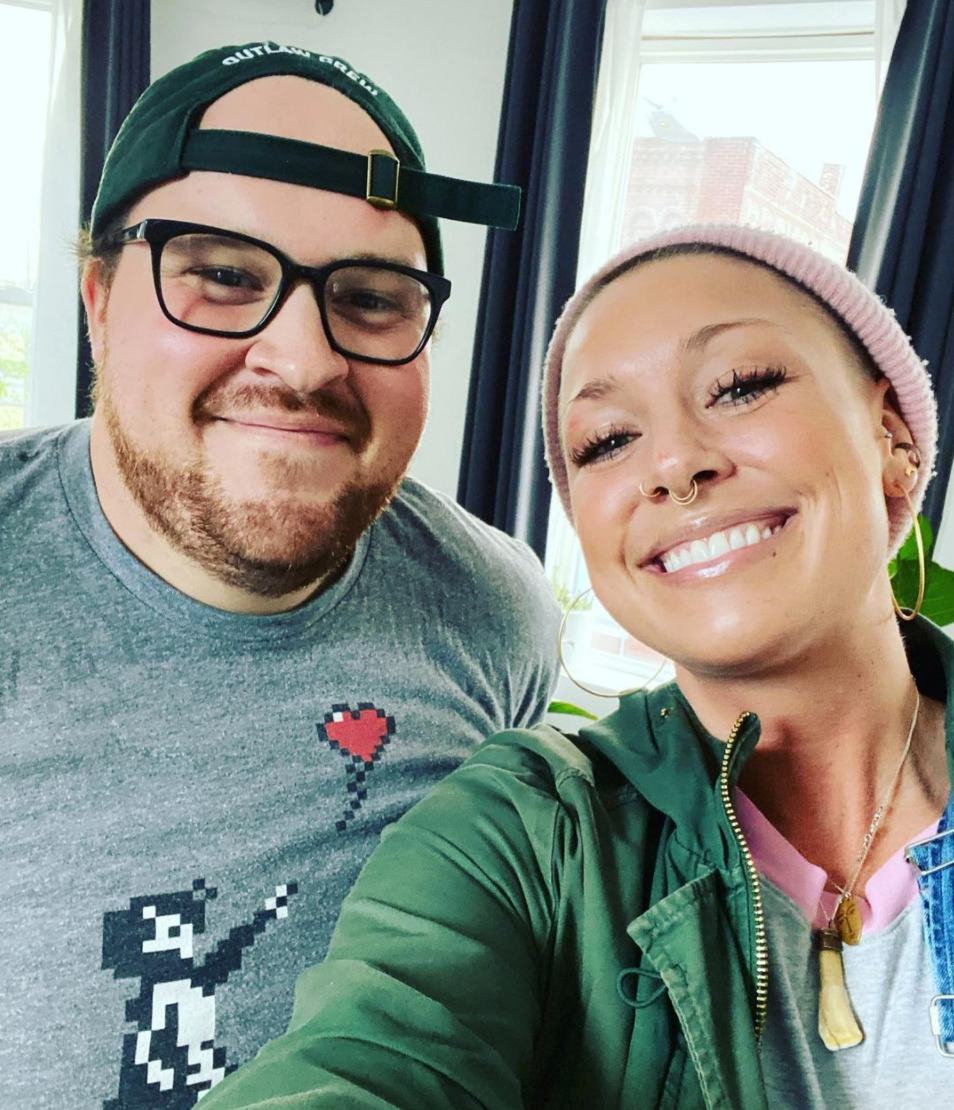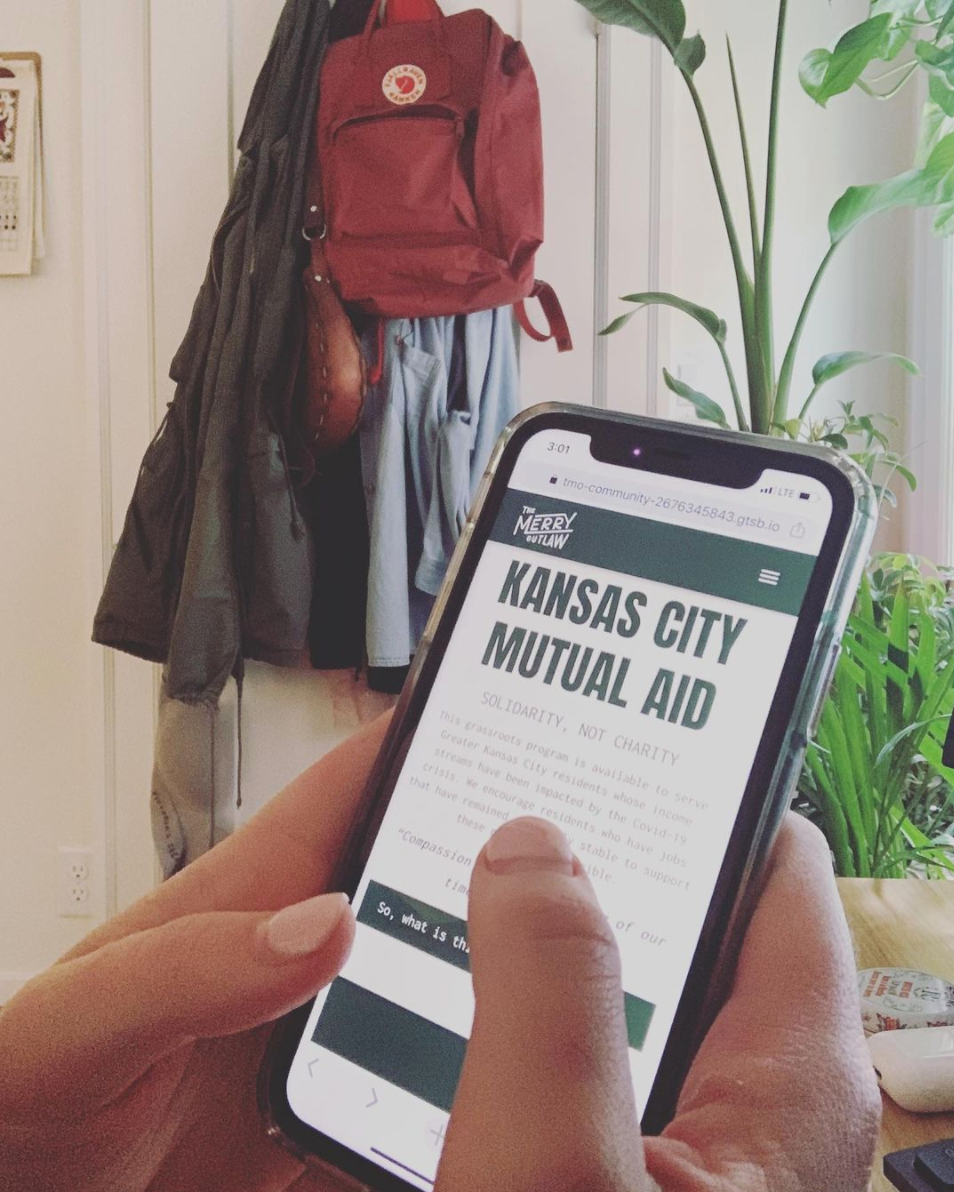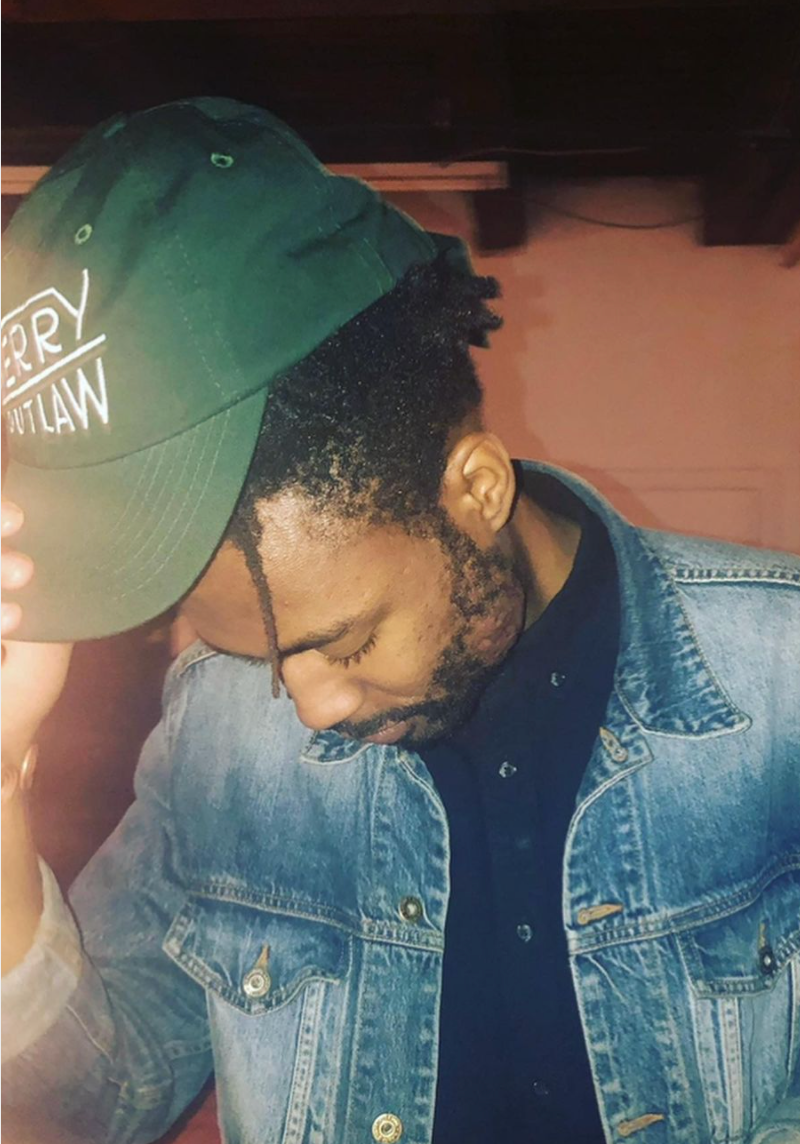Noticing Neighbors The Merry Outlaw
- Hayley Finch

- Aug 7, 2021
- 8 min read
Updated: Aug 8, 2021

$46,385.00 That’s the amount The Merry Outlaw has facilitated in giving from one neighbor to another. The Merry Outlaw is a mutual aid network that is founded on the belief of compassion. This grassroots program encourages Kansas City residents to post immediate needs through the request board on the app, and then a neighbor (anonymous or not, depending on preference) can send the financial means to support. This platform has allowed for assistance in circumstances many people have faced in this past year: challenges with rent, groceries, utilities and more. I got the chance to talk with Lindsay, The Merry Outlaw founder, and learn how the organization began.

Hayley: How did The Merry Outlaw start? Did you always know what it was going to be? Lindsay:
You know, our original mission was to create a restaurant. One that had a social concept: where people could come and overpay for their dinner, so that we could provide vouchers and folks to eat a lunch for free. But while we were imagining that, we also wanted to build an app where people could exchange resources at the restaurant. That way folks could come in with lunch vouchers, and put in the app that they need a baby crib, or they need rent relief, things like that.
Hayley:
What a great idea. Lindsay: Really just building that community hub, right? Folks can come in for dinner and respond to those needs via this app, then use the restaurant as a safe space to exchange resources. That was the plan. Hayley: And then? Lindsay: And then covid happened. We were actually going to start with a food truck just to prove the concept to investors and make it work, and then covid happened. Life has obviously changed for everyone. And personally, at that point, I recognized that I was taking on far too much.
Hayley:
How did that show?
Lindsay:
I work 60 hours a week at my day job. I started The Merry Outlaw by myself and it was just too much. So after the first couple of months of covid, we saw a need for emergency cash funds when people were losing their jobs.
That’s when we used the original app idea as a mutual aid concept where people can request money, they can request up to $300, and then folks can go fill those needs directly via the app.

We've been doing this for the last year and we've raised over $46,000 in just peer-to-peer donations. So that's so special to me. Because I'm a big believer in mutual aid: sometimes we can have more than we need, and we will also sometimes need things from our neighbors. If we all can share our resources, then we'll all be happier and safer.
It's cool that so many people are open to understanding the concept!
Hayley:
To have raised that amount when $300 is the cap is absolutely amazing. What else makes this different?
Lindsay: I would say there is a learning curve for people who have donated to United Way and things like that, because for those places they just trust in where it's going. But here it is going directly to a person, and we don't keep anything. So they get 100% of the donation, which might not happen with other non-profits.
Hayley:
That just shows how much you've recognized when you needed to pivot and evolve the mission. Very cool.

How does it show up now? Are there still meals incorporated, or what does that look like?
Lindsay:
Not at this point. So before covid as well, we were running this dinner party initiative where we would have fancy dinner parties and charge 100 bucks per plate. It was a four course meal, super swanky and really private. There were only ten people at each gathering. We had drinks, everybody talked about what community meant to them, and then the proceeds from that would go towards a free meal for ten other people who couldn't afford to pay for it. Hayley:
What a neat idea. Lindsay:
So yeah, we had one dinner. It was really awesome. Loved it. That was around mid-February 2020, and we had plans to do one monthly for the rest of the year.

Obviously, that was canceled. We're still a little uncomfortable with having people gather, you know? Plus, the mutual aid platform has been so successful that I kind of had to back up and say: why do I like the food part?
I realized it felt really good to me. It felt like I could be at a dinner, feel everyone connecting, people sharing, and that it is such a cool concept. It made me feel like I was doing the best work. But when I look at the facts, the mutual aid is how we've raised over 46,000 dollars. And at the end of the day, people need the money right now to not get evicted and feed their children. Hayley:
That’s a real reflection. Lindsay: It was a bit of an ego thing for me to stand back and be like: OK, why are you doing the dinner parties? Why do you want a restaurant? Obviously I had good intentions and I wanted it because I thought it would work. But the amount of work that would go into it would be so much, and the output could end up being very small.
Hayley:
It still is a lot of work, though. Who has believed in you? Lindsay: My parents are late fifties and they have loved it. They have been super supportive. Their first questions when I did it was: well, how do we know these people really need the money?
And that's a hard question for people to wrap their heads around. But for me, if someone is asking for 300 dollars and going to the trouble, I'm going to assume that they need it. It's not my business and it’s about the heart.

There are these sweet exchanges that happen, and you can go see it on the app. People write these little notes to each other. Hayley: Oh, that’s such a great idea! Lindsay: Let me just read you the sweetest one that made me weep. OK, so this was back in April of 2020, someone wrote: First, I would like to just say this is beyond amazing and what you all are doing for those in need. My name is Maria, I'm 31 and have 5 kids. Before covid, things were already rough. It was hard to get employment in the past month.
I was offered a temporary position during this pandemic. I'm grateful, but also still behind on things and don't know when this job will end or if I'll be able to stay. Any amount will help. And thank you again for this opportunity.
So she requested $300.00. That's the max, and this guy responded. Paid the full three hundred and said,
Maria,
You are strong and your children love you for it.
-Keith

The community has been so beautiful to see. Like, people are good and people are honest. And if you give them the opportunity to do that, then I don't think that we have to be policing everything. Because this happens.
Hayley:
Thank you for reading that. I love that everyone is able to write a note.
If someone is new to the app and looking to donate, what should they do? Can you walk me through? Lindsay: Yes. So there's several ways to donate: one way is a tax-deductible option. We have a fiscal sponsorship through Community Capital Fund, which provides a way for people to get that documentation if they would like it.
If people want to donate a large amount of money, they can go through that way on the website and get the tax receipts. So that's great for larger donations. The second option is you can Venmo @themerryoutlaw, or pay on Cash App @$outlawlinds, or on PayPal to lindsay@themerryoutlaw.com. The most popular way is to go directly onto the app,pick a request by reading through people's messages, and then send the money through whichever channel you choose.

Hayley: So you're really sending the money directly to them, and the app is the space where you read their note. Is that a good way to think about it? Lindsay: Yeah, the app is just like the meeting place.
Hayley:
Was there a certain person or situation that inspired the app?
Lindsay:
The app had already been an idea for a while between another volunteer and I, but I will say that just in general I was inspired by a friend. His name is (...), but please don't put that in the article. He was homeless. I met him through a Catholic Worker House called Cherith Brook, where they have free meals, haircuts, and showers for people to come use if they need to.
About ten summers ago I started going and became friends with the people who run it. We were cooking dinners and hanging out. It was so beautiful because everyone there cooked together, ate together, and cleaned up together. There was no: oh, I am not homeless, so I'm serving you because you are homeless. Instead it was: We're all just humans and we're all just here experiencing a meal together.
I became friends with (...), who was sort of like an intern there. He had been homeless for a long time and then ended up helping a lot at this place. And (...) is about 60, gay, has a college degree, and lived in a small town in Missouri before his house caught on fire. Then his wife and children found out he was gay, and they ostracized him. He moved to Kansas City and had been homeless since then.

We had this conversation about homelessness and he was like, you know, it sucks, obviously, but there is some beauty to living every moment in the moment. They don't have a future in mind, they don't want to think about their past, they're just existing here and now.
He taught me that people who are homeless or struggling in some way aren't looking for a handout, they're looking for a hand up. They are looking for someone to treat them like they're human beings and not a homeless person. Like, I try not to even use that word because it's such an identifier. It's such a label.
Hayley:
How did that change the work you’ve done since? Lindsay:
It got me thinking: How can I get people around a table who are different from each other?
Hayley:
So creating that leveling experience. Where it’s just humans coming together.
Lindsay:
It's not like we’re experts on life because we have a roof over our head. Honestly, we could learn more about life from people who have been living in the streets for years and have had to deal with what they have.

Hayley: You have a bird's eye view on the giving that happens by running the app. What goodness have you seen through it?
Lindsay:
I definitely get a lot of emails and messages from people who have received money on the app. They write in to say thank you, and that it really helped. I was able to pay this bill, I was not evicted—that sort of message. And honestly, it's a tiny amount. But to have that emergency cash come to them quickly is really helpful and pivotal, so those messages were expected.
What I didn't really expect was the other side, with donors reaching out to me and saying how grateful they are for the opportunity to give directly. People tell me: I've never been able to do this before. I always want to give money and I don't know how or where to give it. I feel like I'm supporting my neighbors by doing it this way, so thank you. That’s really special to see how many people want to do good on a deeper level, because it's pretty anonymous on the app. They don't get any recognition for it. They just feel like they have more than they need at this time, and want to share it.
To keep up with the latest news on The Merry Outlaw, follow along on Instagram and check out the donation platform on the website.
All media originally published on The Merry Outlaw via @themerryoutlaw on Instagram.
































Comments